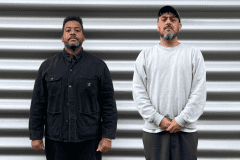Interview: Michael Hill (Tombs) on Everything Went Black Media
It is absolutely impossible to spend any amount of time talking to Michael Hill and not see the sincerity, honesty and passion he puts forward in all of his pursuits. Primarily known for his role as guitarist/vocalist for experimental metal band Tombs, this approach to his musical efforts has earned the band and their albums wide spread critical acclaim from the most discerning critics (NPR, Pitchfork, Decibel). However, what some may not know is that Hill is also a writer who has contributed compelling and interesting interviews and columns for Deciblog, Metal Insider, Brooklyn Vegan and others.
Fred Pessaro of Brooklyn Vegan had this to say about Hill, “Mike Hill’s approach to life is much like his approach to music… firm, disciplined, laser-focused and determined. He isn’t afraid to tell it like it is, warts and all. In a double-talking arena that is the music biz, such candor is refreshing.”
He’s also been blogging and podcasting under the moniker Everything Went Black, recently launching an official dot com for the efforts at www.EverythingWentBlackMedia.com. To date the site has featured interviews with Scotty Kelly (Neurosis), Aaron Harris (Isis), Eugene Robinson (Oxbow), indie comic creator Josh Bayer, and more.
Ghettoblaster caught up will Hill following Tombs’ tour with 16 and Superstorm Sandy to discuss his EWB project. This is what he told us about it.
You just completed a tour with 16 and made it home in time for the storm (Sandy). Were you worried about beating the weather home?
Actually I wasn’t even thinking about it. We covered a lot of ground on this tour and had some long hours of travel. I was peripherally aware of the storm, but it didn’t really dawn on me until Sunday when the tour was over and I was catching up on some sleep.
I was hearing reports about how the storm could be a history making event in the meteorological world. And that’s when I started taking it seriously. Then I heard they were shutting down all the subways around 7 pm.
I was like, “Whoa, I’m alone here in this apartment.” I was motivated to leave and head over to my girlfriend’s place because I am a block away from the flood zone. When it came down to it, I though Mother Nature probably wouldn’t be too sensitive to an arbitrary line – “OK well the north side of Franklin Ave is the flood zone and the south side is cool, so I’m not going to flood the south side.” I didn’t want to have to be rescued by somebody so I just went to my girlfriend’s house.
Everything Went Black has been around for a while in the form of a blog and podcast. When did you decide it was time for it to have its own dot com?
They both started out as a way to get some of my tour journals out there. And with the podcast I just thought it would be fun. I’ve always been interested in the conversation end of things in interviews.
As you know yourself, sometimes in the editing process a lot of the nuances of conversational speech gets lost. So that’s what I really enjoyed about doing the podcast. You get a real flavor of the people who are involved in the conversation.
Then just recently over the last year I saw that both were doing pretty well just on word of mouth, and my own meager attempts to promote it with my Twitter and Facebook. I thought it would be cool to design a portal site where I could put everything together in one spot. I’m also working on some video projects too that will be unveiled on there in the next few months. It was a way of getting all three of those things in one spot.
Is this more of a hobby or a professional undertaking for you then?
At this stage in the game I’d like to approach it more as a professional undertaking. It’s the kind of thing I’d like to do a little more frequently. I feel like I’d like to work more around a schedule and put out at least two podcasts a month, to expand the blog into doing more journalistic pieces – articles about things that are really interesting to me like music, martial arts, esotera like ancient civilizations, The Mayans, that kind of stuff too. The video pieces will delve a little deeper into that aspect of things as well.
You’ve been a regular contributor for a lot of music publications including Brooklyn Vegan, Decibel, those kind of things. Does your approach differ for EWB, and do you have a background in journalism that has prepared you for this undertaking?
I have no formal background in journalism. My background is in engineering and mathematics. Writing though, even when I was in college, I always thought it was more than a hobby. I took a lot of literature and creative writing classes as electives in college. My focus was ofcourse on material that was part of my major; fascinating subjects like Calculus and stuff like that.
But as I’ve gotten more and more into writing over the years – mainly in the form of journals and poetry and lyrics and short expository pieces of my observations on the world – I decided that I would actually like to put this out there for people to check out. That’s how I got involved with writing.
As far as the other stuff goes, I had an interest in doing interviews and got assigned a bunch of different things. As a result I got to meet with some of my idols such as Henry Rollins and Keith Morris. Also being interviewed myself in the various different bands that I’ve played in gave me a wide pool of what some of the typical questions you ask someone that you are interviewing are. That allowed me to see what types of questions as an interview subject that I did not like talking about. I thought about how I could make things a little more interesting for the parties involved including the person being interviewed and the reader.
A lot of times I read Decibel, I read Punk Planet, I love Terrorizer, MRR, and I’ve read a lot of interviews with artists that I like. But sometimes I’m left wanting more from the interview; more follow up questions on those subjects. So that is part of my mission with my own thing. I want to hit some of the generic stuff you find in a rock interview, like “What are your influences?,” that kind of thing. But all of that stuff can be taken care of in the introduction. The kind of things I’m interested in are “What is the motivation for the artist?” “What is their process like?” “What sort of creative goals do you have?” This is the meat of creativity as opposed to background information.
Well you have a home court advantage with doing those kinds of interviews because you’ve lived that lifestyle. Do you feel like you create an atmosphere of comfort that isn’t typical of an interviewee/interviewer type situation?
Possibly. Number one, I actually know some of these guys personally so there is a friendship thing going on. And also I think they view me as someone who can have more empathy to their situation than some guy who is strictly a journalist and may not have ever been in a studio or on tour or any of those other things.
Over the years you’ve been an interviewee a lot I imagine. Do you find that it is more or less challenging to tell your own story or to help someone else tell theirs?
They both work together in a way. By interviewing other people I learn what to do and what not to do when I’m telling my own story. It is a symbiotic sort of relationship.
Were you intimidated by Henry Rollins or Keith Morris?
Luckily I interviewed Keith Morris first and I was super tuned in while talking to Keith. He’s an icon. He’s been part of the punk, hardcore and independent music world since day one really. I recall having a very anxiety ridden half hour leading up to the interview. But then when he came out and talked it was totally cool. He was a very personable guy.
Then with Rollins, moreso because I have such respect and awe for him and wanted to make sure I had my shit together when I talked to him, I really wanted to talk about interesting things. So I was really intimidated by Rollins. Once again though, he was a really easy interview. I found with Henry that when I gave him a couple of cues it made him very easy to talk to. You know what I mean? Asking about things that he was interested in. He would just go off and expand on all those ideas. I didn’t want to focus on just his music, but more on what was currently going on with him. He’s really interested in politics and sociology and those kinds of things. So I tried to cover that and hit on some things that were interesting to other people. At the time he was curating this Stooges thing in Michigan and I wanted to talk about that. I hope that I have the opportunity to do it again; he’s a really interesting guy.
When I first met you I remember that you were really interested in martial arts and physical fitness, and with the website leaning more toward those sorts of things have you had the opportunity to interview some folks that are fighters or involved in the occult things that interest you?
Last year I did a podcast with some of the folks from Enchantments, which is an occult, Wiccan store here in New York City. It was basically a Q and A session where we talked about the roots of Wicca and about realistic occult practices vs. what everyone thinks it involves. It isn’t this satanic, evil kind of thing. It is more about hidden knowledge, and the practice of things that bring you closer to nature and the energy of the planet as opposed to malevolent satanic forces. That was informational.
Eugene from Oxbow was one of the only fighters that I’ve interviewed. He’s done tournaments with MMA. Gavin Van Vlack who used to be in Burn and Absolution is involved in the sort of lifestyle that I’m trying to live, which involves training and martial arts. Positive living in the sense of nutrition and exercise. Training yourself to live better. Your physical existence effects your mental capacities. After talking with those guys I’ve gained access to other people and I’m hoping to expand the site and conversation in those directions.
That’s sort of an opposing view for musicians in heavy music isn’t it? I’ve interviewed a lot of people who aren’t at all interested in putting positive things into their minds or bodies…drawing on the negative energies for their situation and output. Is there a dichotomy between playing dark music and living a positive, clean lifestyle?
For me personally, I feel like being a negative dude would just create problems. All you have to do is change your viewpoint and become a different person. I used to be a way negative person. You probably met me a few years ago. I don’t think I was necessarily a bad guy, but I had a lot of issues and things to work out. I think when people put their mind to it and open themselves up to other ideas they can change. If not, you become a dead end.
I could honestly care less if people have criticism about this lifestyle. Just because I’m not snorting cocaine and being that kind of dude…that’s not the way I want to live. My lifestyle will allow me to continue to play music and be creative well past the point where these other guys are going to fall off. The goal for me is to continue doing what I’m doing and to be the best that I possibly can. My goal isn’t to play a role or be this super kvlt, with a k, guy. That’s a costume and it’s unfortunate.
If you are miserable all the time it is a horrible thing and you should try to change it. There will be a negative end to it. And that’s not something I wish on anybody.
I’ve interviewed other people too recently who had drug and alcohol problems early in their careers and have changed their lifestyle for the positive and I definitely notice that a lot of them are stronger now than they were in their supposed heyday. There is a clarity there that comes with living that new, energized lifestyle.
I agree completely.
I know you have an interest in horror literature too. Any chance we’ll see you catch up with Robert Kirkman?
I would love to. I bet everyone wants to talk to him these days. My love of comic books has put me in the periphery of talking to some comic book creators. Kirkman started off in comics. So maybe, that would be great. I’d love to.
Who is currently on your wishlist? Where are your sights set for EWB?
I’d love to do Ed Brubaker. He’s doing Captain America and Daredevil and has his own thing going on with Criminal, which is this great ongoing story arch or mini-series in this noir, alternate world. His writing is a style that is very identifiable. He’s someone I’d really like to talk to because a lot of his work is very cinematic and draws on the ‘70s anti-hero films that I’m a huge fan of like Bullet. He draws on some of the finest filmmaking from the ‘70s for an influence.
I’d love to talk to Brian Posehn . He releases records on Relapse and he’s also a huge metal fan. His brand of humor is very observational, which is something that I feel a connection with. I think he’s a comic book fan too.
As far as other musicians, I’d like to follow up with Scott Kelly for a podcast. We initially talked with the intent of it being a podcast, but technology wasn’t on our side that night and the quality wasn’t quite there. I’d love to revisit him.
I’d also like to talk to Aaron Turner again. I talked to him on one of the legs of the final Isis tour. Now that it has been a couple years I’d like to catch up with him. He had some defined goals at the end of that tour that he wanted to achieve. I’d like to see where he is with all that. He’s a friend, so it would be a cool, casual kind of thing.
I’d like to talk to John Joseph, who I’m not sure I fully agree with, who was at one-time singer of the Cro-Mags. He sort of gets on the spiritual side of things and I’m interested about what his practices are and how he reconciles that and the drama associated with him and the Cro-Mags saga.
At some point, I’d like to talk to the leader of my jiu jitsu academy, Marcelo Garcia. He’s been a great inspiration to me personally and I’d love for him to tell his story. I think that even people who aren’t familiar with jiu jitsu and training, will recognize the value in the things he says about perseverance and dedication and how it can be applied to any pursuit you have.
I’ve seen some discussion by people who have worked with you in the past in a journalistic capacity and the prevailing view is that your work really embodies integrity. I imagine you’ve personally received some of that feedback. How rewarding is it to hear that?
It is incredibly uplifting. Some of the people that have made those statements to me are people I really respect like Albert Mudrian. He’s particularly inspiration because he assembled Decibel, which is a magazine with integrity. Decibel has avoided a lot of the pitfalls associated with other publications who have chased sales to the lowest common denominator. Decibel maintains integrity and supports things that they believe are crucial. So to have Albert make a statement to me like that means a lot to me.
I don’t have a background in journalism, but I throw everything I have into this and hope for the best. Any recognition for anything I do, when people see my hard work and think it is good and are motivated to say something positive about it, means the world to me.








Social Media